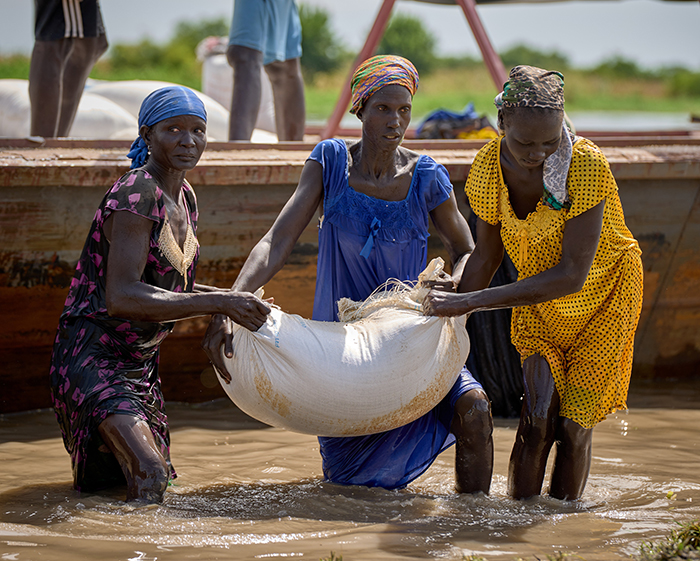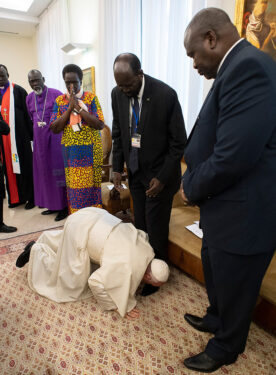
PROSPECT HEIGHTS — Until about two weeks ago, many citizens of South Sudan were getting ready to walk more than 200 miles to greet Pope Francis and his trip to African nations.
South Sudan is the world’s newest nation, but it came into existence in 2011 with worsening problems, such as civil war and famine. About half of South Sudan’s 11 million people are Catholics, who hoped Pope Francis’ visit, which had been slated for July 5-7, would inspire reconciliation in the war which has exacerbated festering food shortages.
The trip was billed as an “ecumenical” pilgrimage, with participation from Presbyterian and Anglican leaders. The itinerary included an earlier stop in the Congo. But a nagging knee ailment forced Pope Francis to postpone.
“The coming of the Holy Father was our only hope because of the respect people have for him,” said Mary Akol Chok, the mother of three, and a teacher in Rumbek, South Sudan.
“He would have talked to our leaders,” Chok told the Catholic News Service. “There could have been reconciliation and peace. The people of this country have gone through the pain for a long time, and we have never experienced happiness as people.”
However, this week the Vatican’s press office announced that Pope Francis will send his Secretary of State, Cardinal Pietro Parolin, to Africa in his place.
“Following the postponement of his Apostolic Journey to the Democratic Republic of the Congo and to South Sudan, Pope Francis has decided to send Cardinal Parolin, to Kinshasa and Juba in order to show his closeness to the beloved peoples of the Congo and South Sudan,” the press office announced June 27. Cardinal Parolin’s visit will take place July 1-8.
Ed Clancy, outreach director for Brooklyn-based Aid to the Church in Need, said such visits from the Holy See are vital to “help people to rebuild hope.
“[South Sudan is] “an impoverished country, and in places where there is great poverty, institutions like the churches become super important,” Clancy said. “They almost always are the places to go when people need resources. Of course, it’s a poor church. They need help. They can’t survive on their own.”
South Sudan became an independent nation 11 years ago with a vote to secede. Before then it was a southern portion of Sudan, but its population was predominately Christian and a target of modern-day slave traders. Clancy said Sudan’s government did little to control the violence, which resulted in the vote to secede.
But South Sudan was born with built-in problems, such as an arid environment hostile to food production. And recently, when it has rained, the hardened ground has shed the runoff, causing catastrophic floods which worsened an ongoing refugee crisis caused by the civil war.

This armed conflict is described as a political dispute between Vice President Riek Machar, a member of the second-largest ethnic group, the Nuer, and President Salva Kiir, who belongs to the largest tribe, the Dinka.
Both men were part of a 2019 spiritual retreat to the Vatican in which Pope Francis bowed before them, kissed their feet, and urged peaceful reconciliation. The incident fueled excitement for the pope’s now postponed visit.
Meanwhile, the humanitarian group, CARE International, reported on June 21 that more than 7.7 million people in South Sudan risk deteriorating food security. An estimated 87,000 of them fall into the worst classification — “catastrophic.”
“On top of lack of food and soaring hunger, South Sudan is also facing a worsening malnutrition crisis, especially amongst pregnant, breastfeeding women, and young children,” said Abel Whande, the South Sudan country director for CARE. “This year, we have so far treated 26,460 children with malnutrition in 49 health centers.”
CARE also noted that South Sudan is suffering from Russia’s invasion of Ukraine, which grows most of the wheat consumed in Europe, the Middle East, and Africa. That war has dramatically curtailed exports of Ukrainian wheat and other food products.
“Urgent funding is needed to be able to address this worsening hunger crisis,” Whande said in a statement.
Clancy agreed, saying: “I don’t want to sound like a broken record, but we are called to help. And the thing about the Church is we don’t help only Christians. The presence of the Catholic Church means … help everyone. The first thing is supporting widows, people from broken homes, and operating places that provide meals for children.”
ACN is working in that area, while the Manhattan-based Catholic Medical Missions Board is working to provide medical care to women and children in South Sudan. For information on these efforts, visit churchinneed.org and cmmb.org.
This article includes the reporting of Tonny Onyulo, Catholic News Service.
